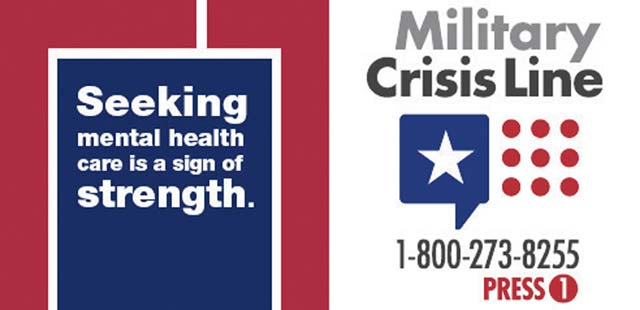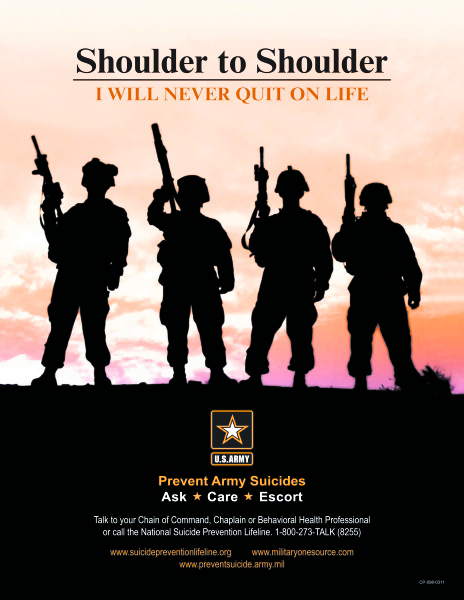
Although suicide and suicidal attempts don’t happen as frequently over the holidays, learn about the available resources to provide help just in case. Servicemembers, including members of the National Guard and Reserves, along with their loved ones can call 1-800-273-8255 and Press 1, chat online at www.MilitaryCrisisLine.net or send a text message to 838255 to receive free, confidential support 24 hours a day, 7 days a week, 365 days a year.
With the joy of the holiday season right around the corner, should people be worried about suicide? Definitely, because suicide awareness and prevention are topics people should be concerned about year-round, said Yancy Chandler, U.S. Army Garrison Rheinland-Pfalz Suicide Prevention Program manager.
According to the Centers for Disease Control and Prevention’s National Center for Health Statistics, suicide rates are lowest in December with rates typically peaking in the spring and the fall. Garrison statistics show suicidal ideations and attempts are down overall this year compared to 2016.
“Although it’s a myth that suicides happen more frequently during the holidays, it’s still a good idea to talk about it throughout the year,” he said. “Just because suicide rates may be lower during the holidays, it doesn’t mean that suicide and suicide attempts won’t happen. That’s why it’s important to ensure we are looking out for each other and know about the available resources to get help.”
The holiday season can be fun while living overseas with all the Christmas markets, festivals and outdoor activities to participate in, but it can also be a lonely time for people because of holiday stress, Chandler said.
“Some people think about suicide during the holidays because of the stress of being unable to travel home or from experiencing financial issues when buying gifts for family members and friends,” he said.
That’s why Chandler emphasized the importance of connecting with people — especially if they are single or geographically separated from a spouse.
“The big issue is people withdrawing from family and friends; so to stay connected, use audio or video calls to keep in touch with loved ones back home,” he said. “What unit members can do to help those who can’t go home to the States during the holidays is invite them over for dinner or out to a Christmas market or a coffee shop to develop that connection and keep people from being alone over the holidays. There are also several programs that can keep people engaged like Better Opportunities for Single Soldiers and Family and Morale, Welfare and Recreation trips.”

People can also connect with the community by volunteering over the holidays with Army Community Service, local schools and Parent Teacher Organizations, post offices and Armed Forces Against Drunk Driving on Friday and Saturday nights.
Relocating overseas can also be a huge cause of stress over the holidays, Chandler said.
“If you have an inbound single or married Soldier or civilian employee traveling overseas with a spouse, children and pets, that’s a whole different kind of stress at this time of year,” he explained. “Finding transportation to and from inprocessing appointments, finding housing, registering your children for school or daycare, getting a job for your spouse. All of those things are already stressful enough, but add that to holiday stress and it could be too much for some people to handle.”
Chandler advised unit members, not just sponsors, to assist newcomers as much as possible when they arrive and to involve them in activities to acquaint them with the unit and German culture. Looking out for their new battle buddies and knowing about garrison resources can help save lives, he said.
Resources available in the Rheinland-Pfalz include family members, chaplains, unit chain of command, behavioral health, Military Family Life Counselors (Kaiserslautern: DSN 483-9011or Baumholder: DSN 531-2859) and the Military Crisis Line at 00800-1273-8255 or DSN 118.
People can also take advantage of the suicide prevention courses offered as well.
Applied Suicide Intervention Skills Training (ASIST)
Dec. 6-7 (Kaiserslautern)
Jan. 18-19 (Sembach)
March 22-23 (Kaiserslautern)
safeTALK
Dec. 1 (Kaiserslautern)
Feb. 1 (Baumholder)
March 1 (Kaiserslautern)
“Suicide doesn’t just affect the individual, it has lasting effects on families, friends and whole communities,” Chandler concluded. “We can reduce suicide factors by creating awareness and resiliency within our community to help make positive changes in the Rheinland-Pfalz.”







